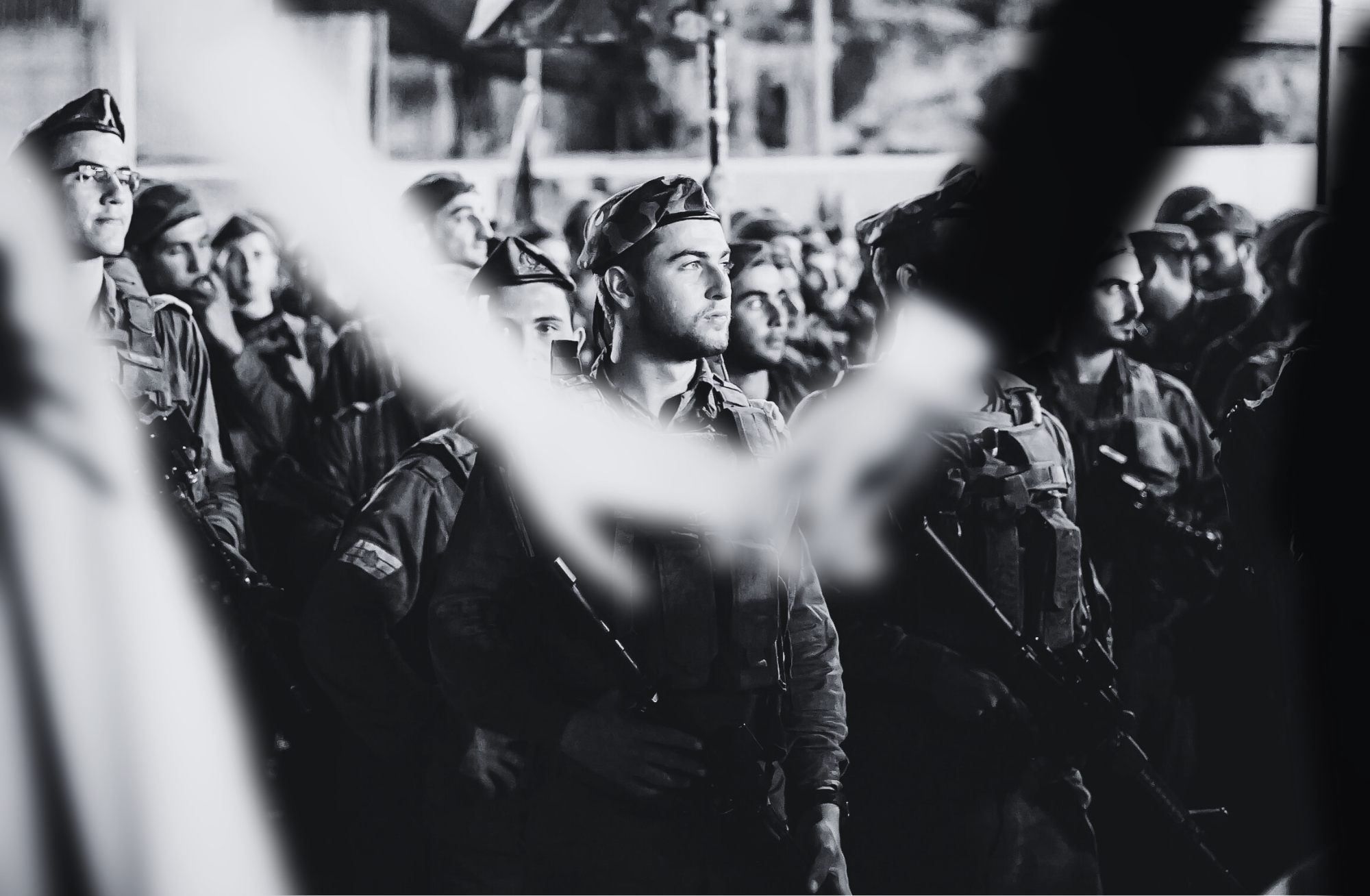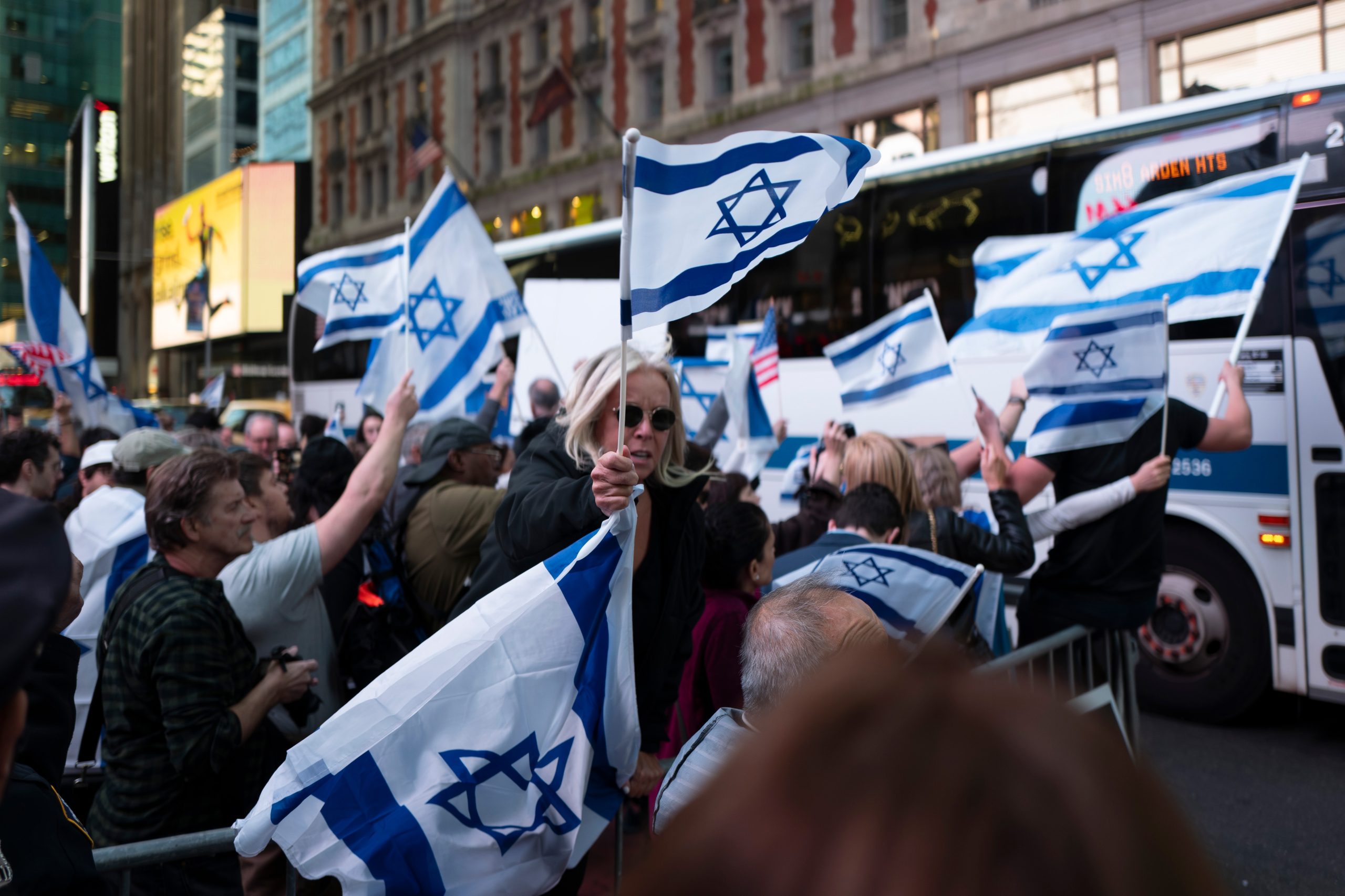“Why can’t they wait? Does Jewish law obligate them to go ahead, no matter what?”
The question came from a journalist, representing a prominent national publication. It was provoked by what was becoming an increasingly common shared image: pictures of weddings from Israel. These pictures, however, were not the sort familiar from living room walls or caterer’s catalogs. In many of them, the groom wore an army uniform; in some, the bride did, too. A few of the weddings were clearly being performed on army bases; others were being rushed moments before the call of military service would separate the couple.
Why, wondered the journalist, must the show go on, when this can hardly be anyone’s dream wedding? And together came another question, also presented by the grim circumstances: Does Jewish law mandate any priority, when both weddings and funerals await?
The truth, I endeavored to explain, is somewhat complex. Within that complexity, however, is a map of the current psyche of the Jewish People.
The Talmud describes a tragic situation: A wedding is all set to take place, prepared beyond the point of no economic return. Then, at that last moment, a parent of either the bride or groom passes away.
The show, indeed, goes on. The deceased is taken to another room, the funeral put on hold. The chuppah proceeds as planned, and only after may the burial take place.
More surprising, perhaps, is what happens next: One would expect, following a funeral, there would be a shivah. Not yet, in this case; First, the marriage must be properly celebrated, for the full seven days. Only after that will the shivah be conducted.
What emotions dominate this bride or groom, rushed to the marriage canopy from their parent’s deathbed, committing to lifelong joy before the body is buried? Can they wipe away all of their tears for a full week? Should they?
One is inclined to picture the perfect “Halakhic Man” of Brisk, for whom emotion is ruled by law. Rising, literally, to the occasion, he recognizes that he is like the mourner whose shivah is abbreviated by the onset of the festival, who gets up, his grief having been officially suspended from on high: “The rejoicing of the community enters, and defers the mourning of the individual.” The halacha defines reality: There is no longer reason to weep; the Talmud has told us so. All that remains is mandatory joy, and no loyal Jew could feel otherwise.
Perhaps. And perhaps not.
Perhaps the emotions are what they are, the inescapable reality of each individual’s experiential landscape; tears coming when they will come, sometimes of anguish, sometimes of joy, sometimes both, mixed inseparably in the same drop. From within that wordless whirlpool, the halacha finds nuggets of articulation, and coaxes them outward, into the world of practice, where each feeling has its space, no poorer—in fact, maybe richer—for having been overlapped by its opposite.
What, then, does the hallowed system dictate, for those of us who seek to share those spaces with those who mourn, with those who celebrate, and with those who can’t know which experience they are living? To which do we turn our attention first?
It would seem, from an initial glance at the Talmud, that the matter is settled. If a funeral procession and a bridal entourage meet on the road, the path is cleared for the bride. The reasoning is explicit elsewhere: Without question, honor for the deceased is a paramount Jewish value; and yet, when in conflict, we always choose first to honor life.
Thus, it seems, the perfect policy for the current moment: amid all the devastation, the terror, the loss, the grief—“choose life!”
However, it is, of course, not so simple. Nachmanides indeed applies the Talmud’s ruling broadly: Attending to the needs of a bride, and the wedding, always comes before those of the deceased. Maimonides disagreed, limiting the Talmud’s statement to expressions of honor. Otherwise, one’s attention should first go to the deceased. To this end, he cites a verse: “the heart of the wise is in the house of mourning.”
Maimonides’ dissent is not purely his own; it is influenced by a number of other rabbinic sources, that show some degree of preference for prioritizing mourners over celebrants. Notably, the Scriptural source cited is one more well-known, two verses earlier: “tov la-lekhet el beit avel m’lekehet el beit hamishteh b’asher hu sof kol ha-adam, ve-ha-chai yeten el libo”—“It is better to go to a house of mourning than to a house of feasting; for that is the end of every man, and a living one should take it to heart.”
Maimonides’ shifting of the source, highlighting where the “heart of the wise” should be, throws the emphasis on the end on the earlier verse, “and a living one should take it to heart.” It is, perhaps, to suggest that the purpose of prioritizing the house of mourning is to benefit the visitor—to provoke introspection, to remind him of his mortality, to focus his purpose. This is indeed how many commentaries[1] understood the intent of the phrase.[2]
It is noteworthy, though, that other interpretations exist as well, and through them, multiple rationales emerge for one choice over the other. To some, “for that is the end of every man,” carries a pragmatic caution, preemptively validating Yogi Berra’s maxim that “if you don’t go to other people’s funerals, they won’t go to yours.” This is a surprising interpretation, as there is a reason Yogi’s comment evokes a chuckle: The Rabbis notably labeled service to the deceased a “true kindness” (chesed shel emet), as there is no possibility of reciprocity. It may be that the point is moral-philosophical, rather than strategic; no one who hopes to be cared for in death can, in good conscience, fail to do so for others.
Yet another interpretation focuses on the recipient of the kindness, the deceased, who has reached “the end of every man”; there will be no further opportunities to display compassion towards him, to include him in the communal family. The groom, by contrast, may invite you to his son’s brit.
To some, the advice contained at the beginning of the verse (“it is better to go…”) simply reflects a cost-benefit analysis. Attending a funeral, or a shivah, is a service both to the living and the deceased; weddings help only the living. Such calculation is echoed in the Rambam’s Mishneh Torah, and thus may explain his position on this matter; he uses similar reasoning to assert that comforting mourners should be prioritized over visiting the sick, and other similar acts.
Assessing the value of the acts, and prioritizing accordingly, was also undertaken by R. Achai Gaon in his She’iltot (3). Attendance at a funeral carries a strong mandatory factor, he notes, in that a kohen is generally prohibited from coming in contact with the dead, but that is overridden when no one else can perform this vital function. On the other hand, marriage is a most vital act, in that it is the first step to populating the world.
The Netziv, R. Naftali Tzvi Yehudah Berlin, in his commentary to the She’iltot, notes the question of prioritization must be more sharply defined. If it is a question of what will take place, or what will happen earlier, weddings, with their contributions to the future of humanity, have greater urgency. However, if both are in any event happening simultaneously, and the question is which to attend, the focus can switch to the impact upon the guest, and the enhancement of his character.
His assumption, following the language of the verse, is that this character growth will come from the introspection prompted by the confrontation with mortality. To be sure, this is one element to consider, and there are others, as the varying interpretations have indicated. Further, aspects of time and place make their own contributions.
Which needs press most urgently at this moment in history? Israeli society has been reminded of its mortality already, in a way unprecedented in its national history. Certainly, final honor to the deceased is a vital mitzvah; at the same time, participating in weddings is its own distinct mandate within the rubric of chesed. As that category generally includes assisting the disadvantaged—the sick, the poor, the dislocated—it bears noting why joining the joyful should also be deemed an act of kindness.
Man is a social animal; it is practically impossible for a couple, no matter how much joy they feel, to give that joy expression and reality without the participation of their family and friends (see Sukkat David al Ha-Torah I, p. 319). Thus, the chesed that is performed by rejoicing with the couple is done by providing a forum for that joy to materialize.
It is the very fact that the couple is already experiencing such joy that obligates others to partake in the celebration. One of the fundamental missions of the Jewish people is that of empathy, the honing of the ability to share completely in the concerns of another. This is not limited to times of crisis; joyous moments are also occasions to express one’s complete identification with the emotions of another. It is the happiness of the couple that presents itself as an arena for this fundamental Jewish value (see R. Yitzchak Kreiser, Ish Le-Rei’eihu, Exodus, pp. 483-484). By contrast, if the bride and groom were to experience the happiest day of their lives, and their friends and acquaintances would be indifferent, this would be a source of anguish for the couple.
The mortality of the Jewish People, their vulnerability and fragility, has received the cruelest of emphasis. The strength of the Jewish nation—not only its physical power, but the true bonds that connect all of its parts, those that cry together but dance together as well—is being summoned to play its role. Most powerfully, in the wake of determined efforts to obliterate the future of the Jewish People, nothing is more defiantly significant than the first steps towards a new Jewish family.
“Let the Jewish people be; if they are not prophets, they are the children of prophets.” Does Jewish law command these weddings to go forward? Maybe not. But the Jewish People do.
Rabbi Daniel Z. Feldman is a Rosh Yeshiva at the Rabbi Isaac Elchanan Theological Seminary (RIETS) at Yeshiva University, as well as an instructor in the Sy Syms School of Business and the Wurzweiler School of Social Work, and serves as the Executive Editor of the RIETS initiative of YU Press. He is an alumnus of Yeshivat Kerem B’Yavneh and received his ordination from RIETS, where he was a fellow of the Bella and Harry Wexner Kollel Elyon. Rabbi Feldman is the author of six books, most recently including False Facts and True Rumors: Lashon Hara in Contemporary Culture. He serves on the editorial board of Tradition, and is a frequent lecturer in locations across America and abroad. Rabbi Feldman is the spiritual leader of Ohr Saadya of Teaneck, NJ, where he resides with his wife and children.
—
[1] See Kessef Mishneh and Lechem Mishneh to Mishneh Torah; Tur and Shulchan Arukh, Yoreh Deah, 360:1, and Bach, Prishah, and Shakh; Resp. Avnei Cheifetz, I, 60.
[2] Ibn Ezra; Metzudat David; Kli Yakar, Deut. 21:10.





































